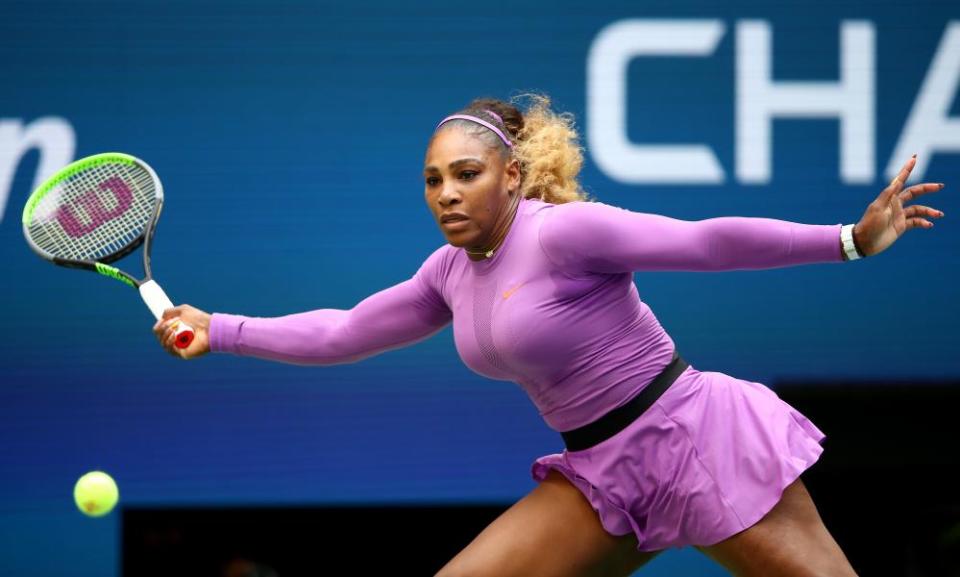Serena Williams won't break Margaret Court's record - and that's OK

Anyone who’s followed the women’s tennis tour closely over the last year wasn’t too surprised when Serena Williams came up short in the US Open final against Canadian ingenue Bianca Andreescu in her latest bid to equal Margaret Court’s all-time record of 24 major singles titles. The only question entering Saturday’s match, same as last year’s championship showdown against Naomi Osaka, was whether a wildly talented youngster in her first grand slam final could hold her nerve against a champion twice her age. And, same as last year, it wasn’t long before it was obvious Andreescu could.
Williams, who has won grand slams in her teens (one), 20s (12) and 30s (10, a record), but has been stuck on 23 titles – one behind Court – since the 2017 Australian Open, has reached the final in four of the seven majors that she’s entered since coming back from the birth of her daughter, failing to win a set in any of them. She turns 38 at the end of the month and is no longer so far ahead of the pack that another title feels inevitable. This is how sports work.
Serena is not going to break this record. And that’s OK.
Williams is the greatest women’s tennis player ever, a fact acknowledged deep down by even her most vehement critics. The record, or, specifically, wanting it to be beyond any plausible argument, is merely completism. Yes, major championships are the sort of established metric of greatness that sports fans dine on by mooring otherwise impossible cross-generational comparisons, but it’s fair to consider that more than half of Court’s 24 titles came before the Open era when the sport’s four bedrock events allowed professionals to compete with amateurs. Eleven came at the Australian Open during a time when many of the world’s best declined to enter due to the distance and comparatively minute prize fund on offer.
Related: Bianca Andreescu sees a remarkable vision come true at US Open | Tumaini Carayol
That’s not a slight to Court so much as context essential to grasping the scope of Williams’ body of work in a sport that’s never been more globalized and competitive, an evolution that’s only accelerated since Williams turned professional way back in 1995. Yet it’s never been clearer the final steps to yardstick supremacy may be a bridge too far. “I’m, like, so close, so close, so close,” Williams lamented after Saturday’s defeat, “yet so far away.”
Four summers ago when Williams won Wimbledon for a sixth time to become the oldest player to win a grand slam singles title in the Open era, she improved to a preposterous 21-4 in major finals, redoubling her reputation as the greatest closer in sports. Since then, she’s 2-6 at the final hurdle. Of course it’s a testament to her greatness that she’s even playing that far into majors at an age when most players have decamped to name-brand academies or the broadcasting booth, but there’s no question the loss of her finishing kick, for which she has no answers, is what’s troubled Williams the most.
The women’s field today is as deep as ever and the young lionesses of the tour, who for years cowered in Williams’s presence before the first ball went up, are no longer intimidated by the sport’s grand dame. Last year it was Osaka. This year it was the fearless Andreescu, now the first player born in the 2000s to win a major, who’s gone more than six months since losing a completed match. It’s not going to get any easier from here.
It cannot be said enough we’re lucky to be living in Williams’ time. The story of a black female Jehovah’s Witness from Compton, who came from nothing and honed her craft on cracked public courts and persevered in the face of racism, sexism, illness and family tragedy to rewrite the history of a sport predominantly owned, played and watched by rich white people, is the ultimate American folk tale: a champion of the marginalized shining on the world stage. Like Tiger Woods, she’s brought people into the orbit of a sport who never would have bothered to watch a tennis match. And she’s blazed a path for a new generation of African American stars, like Sloane Stephens, Madison Keys, Taylor Townsend and now Coco Gauff, who are no longer cast as outsiders by default.
Surely it’s possible Williams grinds out one more major title to tie Court’s mark or even the two she needs to surpass it. We know she’s more than capable of beating any player on the tour on a given day. She will have more than a puncher’s chance at the notoriously unpredictable Australian Open in January, where she’s already been installed as the betting favorite, or the friendly grass courts of Wimbledon next summer where her thunderbolt serve translates so well. Still, time runs short.
Nature may finally be catching up to Serena, but her true impact transcends trophies and leaderboards. Finishing on either side of 24, now more than ever, is immaterial.

